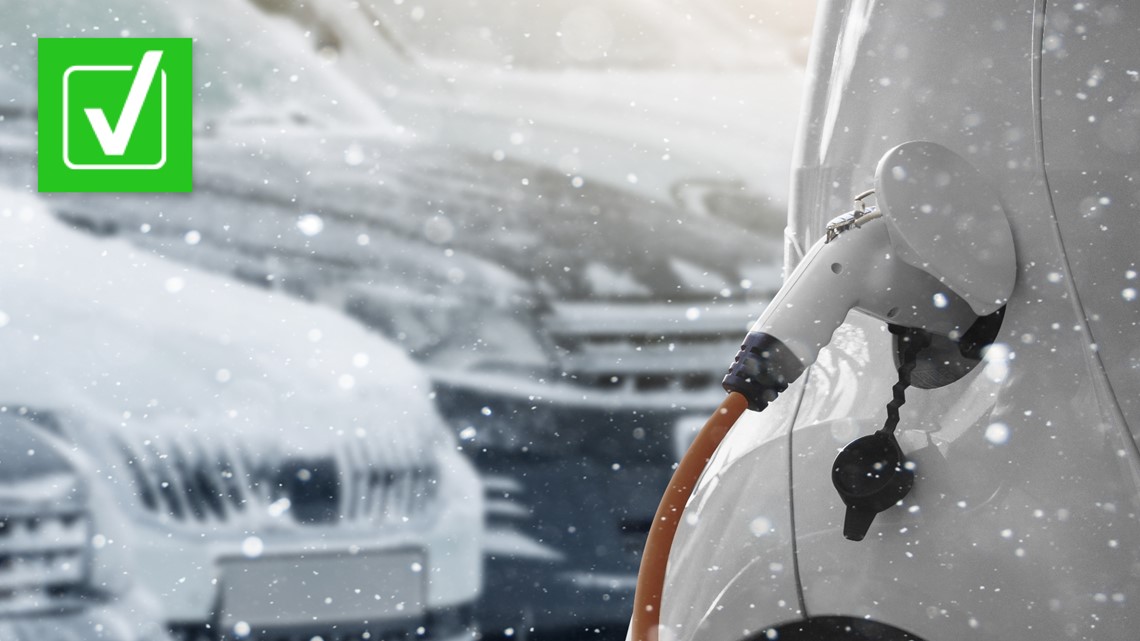Electric vehicle batteries drain more quickly when it’s cold outside, but not so quickly that it would significantly affect most daily drivers.
There are sales of electric cars grew in 2022which means that for many car owners this will be their first winter running an all-battery car.
If you’ve ever used a smartphone outside in the winter, you may have noticed that the battery drains faster in very cold weather. But can the same be said about the batteries that work in electric cars?
VERIFY viewer Marsha asked us via text if it’s true that during the winter, electric cars can lose a significant portion of their normal range, or the distance they can travel before the battery dies.
QUESTION
Do electric cars lose range in cold weather?
SOURCES
ANSWER
Yes, electric cars lose their range in cold weather.
WHAT WE FOUND
There have been several studies that have evaluated the range that electric vehicles can travel without recharging in cold weather, all of which have shown that the range decreases as the temperature drops.
Tests conducted by AAA in 2019 at 20 degrees Fahrenheit, cars averaged only 59 percent of their official range.
I recently conducted similar tests Consumer Reports showed that cold-weather range has improved over the years, but still “cold weather reduces about 25 percent of range at 70 mph cruise compared to the same conditions in mild weather.” For these tests, cold days averaged 16F and warm days averaged 65F.
Experts told VERIFY that the reduction in range is not severe enough to cause problems for most passengers – it should only affect long-haul journeys.
“It won’t be a problem in daily driving,” said Gil Tal, director Hybrid and plug-in electric vehicle research center at UC Davis. “It really is when you drive all day from morning to night. Maybe in the summer you will have one charge, and in the winter two.”
“But most of us run 40, 50, 60 miles a day,” he said. “[So] for a 300-mile car, it doesn’t matter much.’
Most of the losses come from having to keep the driver comfortable. In gas-powered cars, heat is created naturally when the fuel is burned. But in electric cars, heat has to be generated independently, from the battery.
“Electric cars are much more efficient, [since] Most of the energy is used to drive the car, and no extra heat is generated,” Tal said. “So if we need to heat the cabin where we’re sitting, we actually need to use more energy. And it reduces the range of the car.”
One of the reasons that the cold weather range has improved over the years is the development of more efficient cabin heating systems in newer models.
“In the first electric cars, they put almost a heater in there, which consumed tons of energy,” Tal said. “In modern electric cars, we use a heat pump. It is more efficient. And we use heated seats and steering wheel, so you don’t have to heat the whole car as much.”
But not only heating systems can load batteries. Cold weather affects battery performance. Ultimately, because batteries use chemical reactions to create energy, and the reactions happen more slowly in cold temperatures, there is a limit to how much energy you can get from a battery in the winter.
“Lithium-ion batteries don’t perform well at low temperatures,” said Mark Essahny, who runs Laboratory of power electronics and motor drives at Texas A&M. “The amount of energy you can find in them goes down. It’s like putting money in the bank and when you go to cash out, you have access to some of that money.”
Follow us
Want something PROVEN?
https://www.wtol.com/article/news/verify/technology-verify/electric-vehicle-batteries-lose-range-in-cold-weather/536-8c3491bd-88eb-4352-a332-af5874959716



